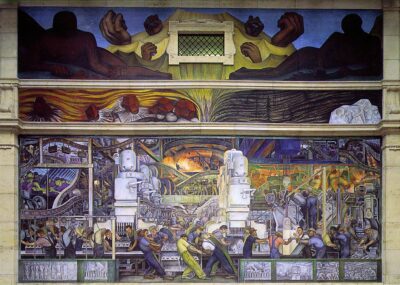Society for U.S. Intellectual History
Call for Proposals
The 2025 S-USIH Annual Conference will be held in Detroit, Michigan, on November 6-8, 2025, at the DoubleTree Suites by Hilton Detroit Downtown – Fort Shelby. The theme is “Creativity and Renewal: Art, Ideas, and Culture in Conversation.” Our conference co-chairs are Chloe Hawkey, Paul Murphy, and Greg Sumner.
One hundred years ago, Detroit seemed like a capital of the modern world—the symbol of machine-age modernity, mass culture, and a new, pluralistic national identity. As it turned out, the modern world was more ruthless and less predictable than boosters suggested, which the citizens of Detroit know better than most. Despite these challenges, post-industrial Detroit remains a place where people, ideas, technology, cultures, and capital mix, and renewal occurs, particularly in the last few years.
This year’s theme invites papers about creativity and renewal; the crossing of borders—of race, gender, class, nationality, religion, and culture—and the hybridized forms that result; the ways in which art, music, and dance become vehicles for intellectual debate and resistance; the nexus of capital, labor, and technology in the modern era; the dreams and failures of mid-twentieth century liberalism and urban policy; and the intersection of religion and social justice.
We invite scholarship about the ways in which social, political, and environmental distress can plant seeds of a better future. How do moments of crisis foster new ideas, policies, art, music, conceptions of modernity? How have intellectuals and artists encountered and embraced technological change? We welcome papers addressing the state of intellectual history today—its relation to cultural history and the creative arts, its definition in terms of method and topic, and how the future of the field relates to its past. Where are the signs of renewal in our field?
We invite submissions that respond to the conference theme, but also welcome proposals that deal with any other aspect of U.S. intellectual history, broadly defined.
Due to the prohibitive costs of hybrid events (in combination with the challenges of making such events pleasant for participants), there will be no hybrid options for presentation or attendance. Within those parameters, we plan to facilitate a conference that is accessible and welcoming to all.
Types of Submissions
Traditional Panels (4-6 people):
A traditional panel will include a chairperson and either three or four presenters. The panel chairperson may also serve as a commentator, or the panel may include a separate commentator.
Traditional Panel submissions must include the following materials: a title for the panel; a designated chair; names, email addresses, and institutional affiliations (if any) of all panel participants; a 200-word abstract for each paper; a separate 300-word abstract for the entire panel; a one-page CV for each participant.
Roundtables (4-6 people):
A roundtable will include four or five discussants. One of the discussants may serve as the roundtable chair/moderator, or the roundtable may include a separate chair/moderator.
Roundtable submissions must include the following materials: a title for the roundtable; names, email addresses, and institutional affiliations (if any) of all roundtable participants; a 200-word description of each discussant’s expected contribution to or intervention in the discussion; a separate 300-word abstract for the entire roundtable; a one-page CV for each participant.
Author Meets Critics (3-6 people):
Such a session will be about a recent book in U.S. intellectual history where one or more scholars will present their analysis of the book, followed by a response by the author themself. One of the presenters may also serve as the chair, or the chair may be a separate person.
Author Meets Critics submissions must include the following materials: the title of the book and a 200-word synopsis/abstract of the book; names, email addresses, and institutional affiliations (if any) of all participants; a 200-word description of each discussant’s expected intervention; a one-page CV for each participant.
Single Paper Proposal:
Although preference will be given to organized panels, we are accepting individual paper submissions.
All individual paper submissions must include the following materials: a title for the paper; name, email addresses, and institutional affiliations (if any); a 200-word abstract for the paper; a one-page CV. Submissions should also include (1) a hierarchical list of themes, topics, events, and other relevant keywords (related to intellectual history, as much as possible); and (2) the paper’s anticipated chronology. These tools will aid in the creation of sessions.
Submission Guidelines
- The committee is especially eager to ensure a diverse representation of scholars at the conference. We welcome submissions from graduate students, professional historians, academics working in adjacent fields, scholarly professionals working outside the academy, independent scholars, and high school teachers. We strongly encourage panels that reflect the diversity of our field in terms of gender, ethnicity, sexual orientation, and/or institutional prestige of panelists.
- Individuals may appear on the program no more than twice. Those appearing twice must do so in two distinct capacities (paper presenter, panel commentator, roundtable discussant, etc.). Participants may, for example, deliver a paper and be a panel commentator, but may not present two papers.
- Our conference venue makes the rental of A/V equipment prohibitively expensive, so we ask that panels not rely on access to it.
- The committee will assume that submission to the conference is an indication that participants will be able to present at any time on November 6-8. If religious practice, teaching schedules, ADA requests, or other obligations limit when you can present, please note such limitations with the proposal.
- All persons appearing on the program will be required to register for the conference and to become members of S-USIH. You can join or renew here.
- All documents should be submitted via email to: susih.conference.2025@gmail.com in a single PDF document. The deadline for submissions is May 1, 2025, and notifications will be sent to session organizers in June 2025.


0